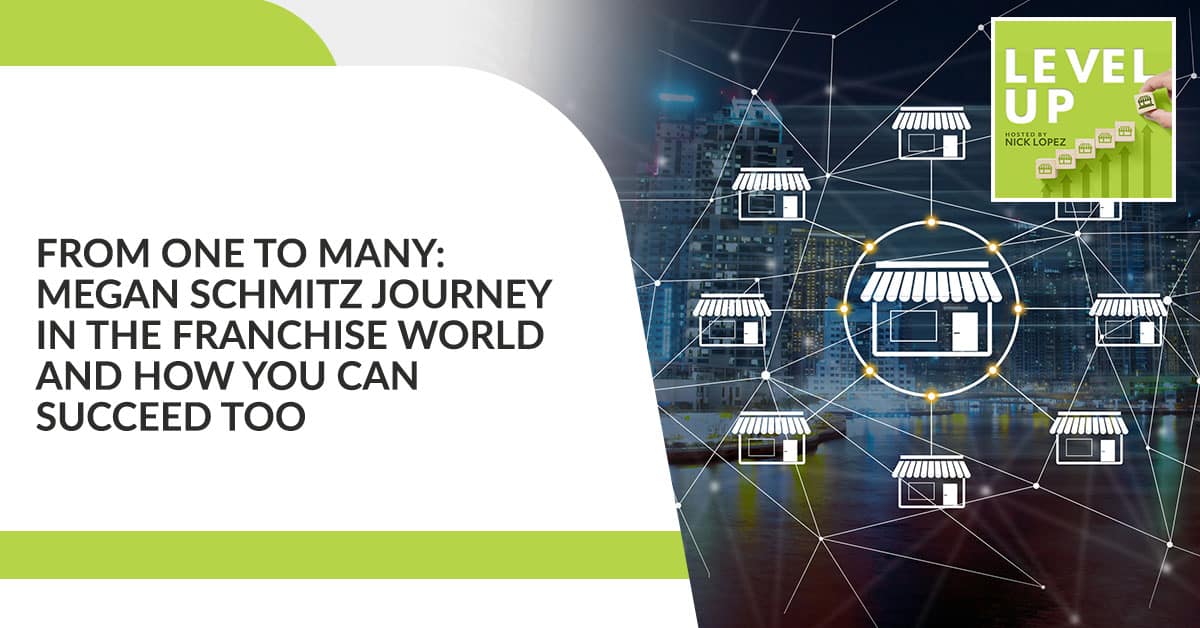
This time on The Level Up Show we have Megan Schmitz to share her journey into the franchise world. This is a true success story in the world of franchising. Starting with just one location, she quickly expanded her business and established a loyal customer base. To continue growing her franchise portfolio, she turned to Fran Choice, a consulting company that helped her find the best franchises for her goals. With careful analysis of location, customer demographics, and business demand, Megan has been able to continue building her business at an accelerated pace. But her entrepreneurial spirit doesn’t stop there. She has now launched the “Free Agent” podcast to share her experiences with others and inspire them to pursue their own dreams. As her reputation as a savvy businesswoman grows, Megan’s franchise portfolio and investments in other entrepreneurs continue to expand.
—
Watch the episode here
Listen to the podcast here
From One To Many: Megan Schmitz Journey In The Franchise World And How You Can Succeed Too
A Story That Many People Would Like To Replicate.
We have the absolute pleasure of learning from thought leaders in business, franchising, and high-performance personal development. Our guest goes without exception. She’s a successful entrepreneur. She’s been a multi-unit franchise owner. She’s an investor in entrepreneurs and startups. She hosts her show, Free Agent, and is a franchise consultant with one of the top franchise consulting firms in FranChoice, Meg Schmitz. Welcome to the show.
Thank you, Nick. I’ve been excited to come on and have this conversation with you.
Many folks don’t necessarily have the clearest understanding of what franchising is. In so many situations, people think of companies like Burger King or McDonald’s and don’t necessarily understand that franchising comes in many different forms and business types. To that end, a lot of people don’t necessarily raise their hand and say, “I’m going to go into franchising or study franchising in college.” In many cases, franchising has a way of finding you. Meg, how did franchising find you?
My husband and I do a lot of investing, and life is certainly different now than when I first got started many years ago. Franchising has a whole different perception now than it did back then. The perception back then came from my family, talking about negative vibes. When my husband at the time had gone to a franchise expo in the Chicago area. He came home and said, “People got to eat. If you have a car, you need it to get to work. Everybody’s got hair, so let’s do this Great Clips thing.” I said, “What? I didn’t know that you were looking to head into business ownership.” We had a one-year-old at the time.
How did franchising find me? It was my husband who went to this franchise expo. It leads perfectly into my three pillars and how I work with my candidates. What he didn’t pay attention to was his wife, our life, and our money. Those are my three pillars. You cannot ignore your wife, your lifestyle, and your money. You should not be making business investments and own outright be the boss of a business that you don’t understand.
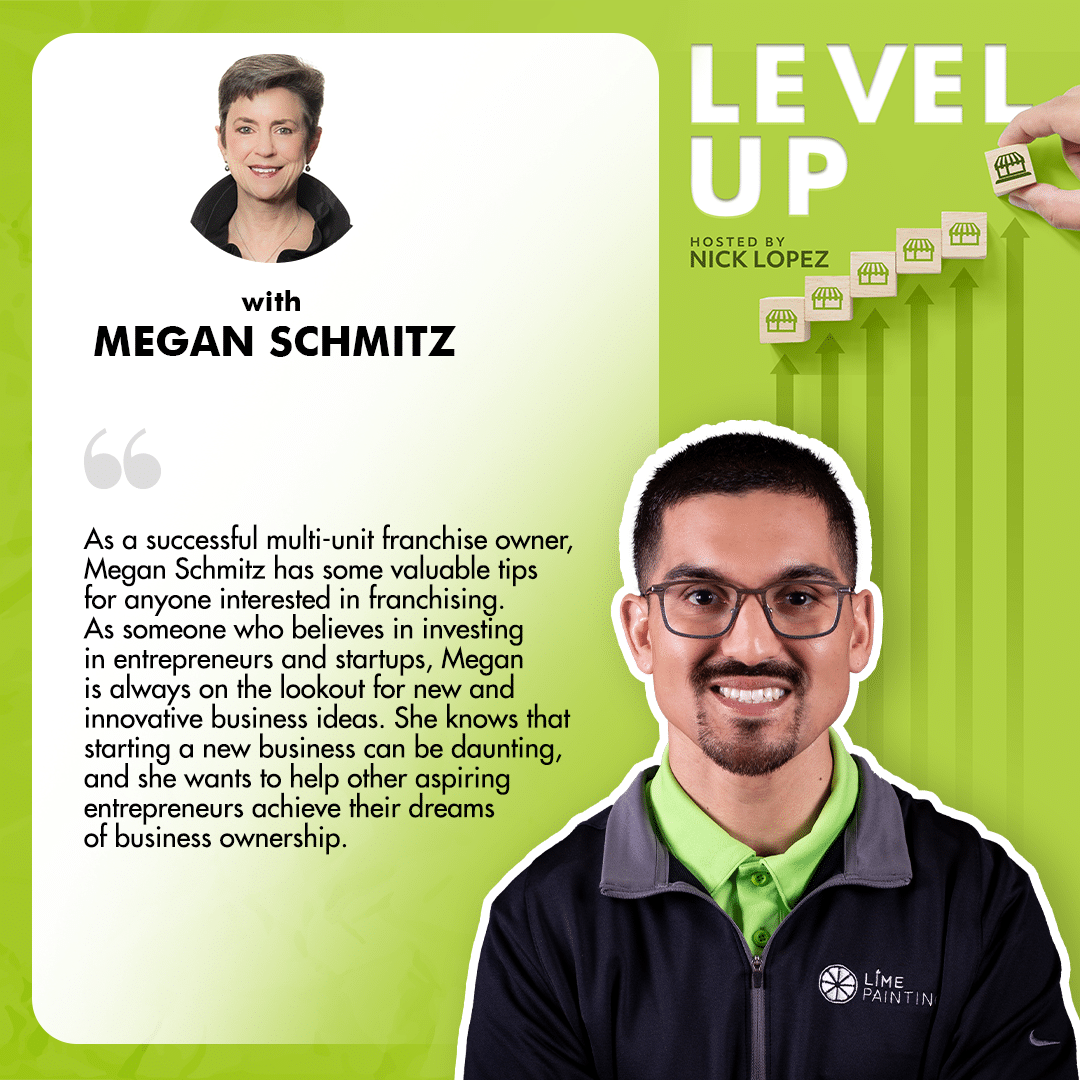
He made a pretty cavalier decision to jump in and that’s how franchising found me. He signed a franchise agreement with Great Clips. Thank God it was Great Clips because it’s a world-class gold-standard franchising even way back then. That’s how I cut my teeth in the world of business ownership. It was with a company that knew how to train their franchisees to be successful owners. My husband wasn’t a great fit for that, but I am a perfect prototype for a franchise owner.
It seems like you ultimately were running the franchise businesses.
About six months after we got open, we realized that we were losing and bleeding to death. He said, “Lock up the doors. Throw away the keys. I’ve had it with this. I don’t get it. I don’t understand our employees.” I’m too much of a terrier to let something go like that. I needed to figure it out. We did figure out that one of our employees was stealing. We had other shenanigans, drug dealing out of the back room. Who jumped in and solved it? That was me.
What were some of the differences in character traits between you and your husband that, at least for Great Clips, made you a great owner versus your husband?
He, to this day, is very much a shiny sparkly, “Look at that. Over here.” The thing about franchising, and you know this too as a franchisor, is not everybody and not every person or personality is the right type of owner, not a good cultural fit, not fill-in-the-blank. There’s something about it or that person that makes them not an ideal owner. Back then, Great Clips were coming to Chicago and they were going to go big or go home, they were on the hunt for people who could write a check and sign. It takes more than that to be a good owner.
I, on the other hand, am not a fixer and a changer and a shiny sparkly thing. Give me a good recipe and you’re going to get a great outcome. He’s not a great fit for franchising. He’s too entrepreneurial and wants to tweak and tune. For me, life is short. I don’t want to recreate the wheel. That’s the difference between the two of us.
Executing on the model, who would’ve thought?
It was a game changer in very short order. Once I identified the person who was stealing and got rid of the problems, the cockroaches in the back room, my other employees came up to me and said, “What took you so long? Thank you for doing it. Now, we’ve got a clean slate. By the way, I’d like to volunteer to take over scheduling or inventory.” I had great people below the manager and the assistant manager. It takes confidence to get rid of your “top people,” but then that’s where you see where the cream rises. After that, we were following the system and running like clockwork.

That’s incredible how making those team changes, all of a sudden, people start falling into the seats where they belong and even more so, stepping up to the plate and taking initiative. Oftentimes, for a first-time business owner, one of the hardest things to do is to make the people changes that need to be made in the organization in a timely fashion. All too many times, those decisions get dragged out and for obvious reasons, it hurts cashflow, morale, and the performance of the team.
All of a sudden, you make those tough choices, which are smart business choices, and things seem to start falling into place a lot easier. They still don’t fall into place by themselves, but you most certainly have the support in helping you do that. That’s all too common. I’m glad you ultimately got into the driver’s seat and you were in the right seat. Did you guys have multiple locations or was it a single location?
Back then, you could only start with a single location. There was no such thing as a 3-territory or 3-unit, 5-unit, etc. We had a single location. We could pony up and sign up for another location and write the check for that license. We started off with a single location. For that particular business model, a single location wasn’t going to throw off enough income profit for either one, my husband or me, to leave our job.
We did end up buying a second location from someone down the road who was out of operational standards. They were on probation. Given the opportunity to cure their problems, I was able to step in and buy it for pennies on the dollar. We bought another license after that. We did start off only being able to buy one, but as things progressed, we were able to expand into more locations.
Clearly, you didn’t have that plan upfront, “We’re going to own multiple locations.”
It became clear that that’s the only way in that particular model that you’re going to create something of value, of wealth, create an exitable model, open enough that someone would want to buy them. The twist on this is that at unit number three, my husband had been saying for a long time that this wasn’t working out. He wasn’t happy. He never should have gotten married. He’s thirteen years older than I am and there were some discrepancies there that weren’t going to get fixed.
After the third unit opened, that was my exit strategy. No alimony, no child support. “Here, you take him. I don’t like this business anyway,” was his statement on the way out. That’s funny because he’s the one who chose Great Clips and got us in, but I was happy to take those 3 and build it to 5 locations. An existing Great Clips Owner made me an offer I couldn’t refuse. That’s when I exited Great Clips and jumped the fence over to consulting.
You mentioned that multi-unit franchise ownership from day one didn’t exist back then. Now, it does. It’s not uncommon to have a franchise partner purchase 2 or 3 territories. You could even purchase ten. It’s not unusual for the right situation. To that point, Megan, and having experience on your end, opening up five territories and successfully exiting them, what tips do you have for somebody that is considering multiple units? What advice do you have in that situation?
It’s human nature that when you get in, you could equate it to getting married and deciding to have kids. You’re not going to have a litter of eight puppies. You’re not going to outright go and adopt a family of 3 or 5 kids. Some people do. The mindset going in is, “We’re going to open one at a time.” What I love about the model, where you can acquire multiple licenses all at once, is that that ties up your insurance program for you.
That’s a territory now that’s locked in. The zip codes are identified. The radius around the locations of the brick and mortar are identified. That gives you a trade area that you can build in to so you can leverage your employee base, infrastructure, marketing, goodwill, and all the things that come from a well-run business.
The real advantage for the person looking to build wealth is to build into a multi-unit mindset from the beginning. You don’t have to open them all at once but build into that wealth-building mindset from the beginning. That’s what will give you a sizeable asset that, at some point, you rather continue to operate because it’s a cash-making machine, or someone will make you an offer and it’ll be a lucrative exit. It needs to look like your brand. It needs to operate like your brand. There are some parameters around what makes it valuable. If you go in with that exit in mind, then you will get there faster.
There are other people though, and you see it with your own brand, who you think it’s a good fit. They’re starting off fine and they’re struggling for whatever reason. Ultimately, it ends up not being the right fit. The nicest thing any of us can do at that point is to say, “Let’s part. This isn’t working out,” and then move on and find an owner who will be more suitable for that brand, that concept, and that culture than maybe the one who’s not the right fit. I say that based on my ex-husband and me.
I love how you said to start with the mindset right from the beginning. There’s something so invaluable about that statement. I didn’t expect you to say that, but so much of performance is mindset and creating that vision, and that why that ultimately leads to you executing and making that a reality. Tying up the territories right from the beginning is paramount, especially with the brand that’s growing fast, that territories are being awarded.
If it’s prime territory and it’s the territory that you want, that is clearly a huge advantage for you locking up that territory right from the get-go and doing that with the right mindset. Speaking of mindset, Meg, you went from 1 unit to 2 to 3 to 4 to 5. You made that decision five times. That speaks to your mindset. What were some of those mindset items that were going through your mind as you were expanding your empire?
These are good points. When you start with one, and with a model like Great Clips, I had 12 to 15 employees per location. When you start to see the quality of the people who are banner-waving, brand loyalists and they’re starting to rise up, if you only have one location, at some point you can only have 1 manager, 2 assistant managers, how many shift managers, but as people want to move up, I needed to expand. I had great people who had aspirations financially. Mostly, these are women who are parents who had kids they wanted to demonstrate. I can think of a handful of my employees who wanted to show their family, husband, and their kids, “This is what your mom can do.” I had to look ahead.
I’ve interviewed people from my own podcast who have said, “Come on. Let’s face it.” Once you get past one, you start to build that inner infrastructure, and you know who’s responsible, you need to start leveraging that infrastructure. They’re going to go. They’re going to leave. It’s much easier with economies of scale, 2, 3, 5, or however many units that is. I’m working with a gentleman down in Nashville who’s up to 13 or 15 brick-and-mortar. He’ll tell you all day long, “It’s so much easier to run this business now than it was with his first one.” I completely agree with that.
Why do you think that is?
It’s because you have quality people who are waving their hands and saying, “I can do more. I have more capacity than what I’m doing. Would you let me do this? Would you let me do that? Can I help you find a new location? Can I help you staff interview?” fill in the blank. You need to acknowledge your quality people by giving them the opportunity to grow.

Do you think vision is a part of that? You cast a vision big enough that it can fit your teammates, visions in it as well, and they want to step in and take more initiative?
I advocate for this now with my candidates who are going through the validation process, to evaluate whether they’re going to buy their own franchise. If you don’t do it, you’re going to lose your people. My learning lesson, Nick, back then is that I better get my button gear and get my money organized so that I can get that 2nd and 3rd location, or my best people are either going to go to the competition or to a different Great Clips owner.
I was not willing after that first story I was telling you about my manager who was stealing. When you identify good people, find ways to keep them, promote them, and give them income opportunities. Love them up. Love them better than anybody else out there is going to love them and they won’t leave. It doesn’t cost you a lot to do that. You have to give them the types of opportunities that resonate with them so that they will stay.
Business is so much about people and relationships and your ability as a business owner to build those authentic and genuine relationships with your team and then turn that into empowering them, giving them direction, and showing them the next step to leveling up. They love it. People love to know that they work for an organization where they can make a difference, where they can have an impact, where they know they’re winning and the vision is big enough to fit their vision, their dreams.
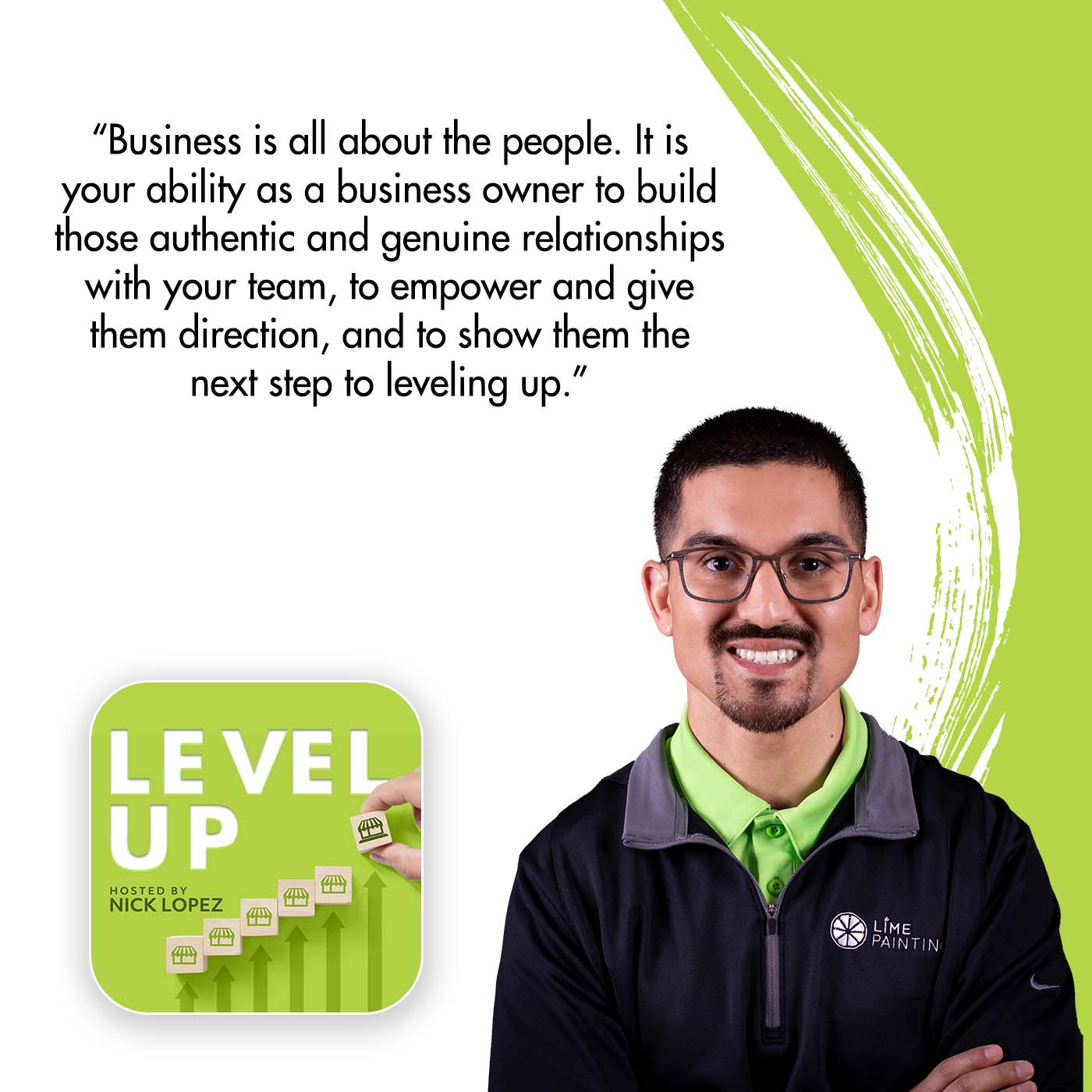
You hit on the head there in saying their income goals. They clearly want to level up from an income standpoint. There’s fulfillment around the position, making a difference, and the relationships with management, ownership, and the team, but you are making a living. Creating that atmosphere for people doesn’t come naturally per se. It’s a skill. That skill may come more naturally to some than others, but regardless, it is most certainly intentional.
Providing your team with that roadmap and getting good at creating that roadmap is paramount for a multi-unit owner being able to create that environment for your team to grow with you and ultimately be empowered and entrusted with helping you in your mission, your cause there within your empire. Meg, this is going to seem pretty straightforward, but from a franchise owner standpoint, it’s invaluable. You had mentioned, “Love them up.” What do you mean by that?
This is so easy. The reason this is such an important thing is there’s a turnstile. You hear it with your owners and I certainly felt it as an owner with Great Clips. You got people coming. You got people going. What is the life cycle of your employee? You have direct control over that. When I got into Great Clips, the life cycle of a stylist was anywhere from 6 months to 2 years. You could pretty much count on total turnover with great regularity. I was not willing to tolerate that cycle. It’s way too much effort. It’s too much money too to have to onboard and then lose people.
As a key to hanging onto people, I used to do this with every employee. It’s so old school. I got out an index card. I had my employee write down their names, kids’ names, ages, birthdates, marriages, husband’s names, anniversaries, favorite packs of smokes, favorite cola drinks, favorite flowers, and candy bars, you name it. You think about the things that if you could leave it for them and say, “Linda, I was thinking about you. I know you’re going through a rough patch. Here’s a sunflower and a Milky Way.”
You would think, “It’s that simple. How much does that cost?” You keep your little file system of what are those little tidbits of love and that’s how you love them up. By the way, that 6 months to 2 years, when I sold my 5 units after 11 and a half or 12 years of ownership, more than half my staff had been with me for 8 years or longer. Love them up.
Who would’ve thought? That’s so paramount. I feel like you spent so much time in your profession at work and you want to enjoy it. So many times, it’s a struggle to get the week started. It’s a struggle to show up each day. Having those relationships and knowing that people have your back, again, business is all about people and relationships.
If you know that the folks next to you have your back and you have theirs, it’s so much more fulfilling showing up every Monday, showing up every day when it’s beyond yourself. You know you’re winning and you’re making a difference. There are only so many things that you need. That’s the combination there. It seems so difficult to do when you look at business ownership. There’s varying success when it comes to this point, which is investing in your people from a relational standpoint, but giving them the roadmap to make more income. I’m sure they didn’t stick with you for all those years because they were barely making bills. They were being empowered and making more income.
Also, being taught how to be a better self-representative. I’m good at what I do. “I gave you that flat-top haircut. The only way you’re going to get it to stand up straight is if you go home with this wax. I can give you the haircut, but if you want it to look like this next week, here’s the stuff I’m putting in. You should buy some before you go home.”
This is not only empowering my employee to think differently. Make a recommendation. You’re not selling something. You’re making a recommendation that will enhance your tip. It’ll enhance your income because now, you’re selling products as well. I was spending a lot of effort also in educating my employees on how they could increase their income. It was a big piece of how I ended up with that retention.
Another example I would give you and your readers is if you take the pyramid, at the top is yourself. That’s not the whole purpose of owning a business. If you take that pyramid and turn it upside down and all your employees, your frontline people are top of mind and you take care of them, then everything else well should come down through the funnel and you’re the beneficiary of your employees having a great culture. To your point, they’re wanting to come in every week, every day. You can help them put their game face on and do their best.
That was so empowering for me to learn as a corporate refugee. I had a full-time job until the third location. I could create enough income that I could walk away. That was a big paradigm shift, to start thinking like my employees and how I could educate them to make more and do better. It started with putting them first at the top and knowing that the happier they were, the more profitable my business would become.
You said it, the upside-down pyramid. It’s gold. You learned it here from a five-unit franchise owner who successfully exited. Have that upside-down pyramid mentality. Meg, I didn’t realize we were going to go here. Being so relationally focused, business is clearly a people business. How you treat your team clearly creates success so that you can replicate it over your 1st, 2nd, 3rd, and beyond units.
Thanks for that, Meg. I appreciate it. We’ll put a cap on that with the upside-down pyramid. Remember, upside-down pyramid, frontline workers at the top. It’s not top-down. That does not make sense. Think about it in your everyday life. It’s not the way to grow a business. If that’s your approach, top-down, you’re probably only going to get into that first unit and struggled from that point.
Meg, you are a franchise consultant with FranChoice. You help matchmake. You help people identify the right opportunities in this vast world of franchise opportunities. People have these aspirations of entrepreneurship. They want to be in business for themselves, but not by themselves. They understand the value and the power of the franchise model.
You mentioned Great Clips having tremendous training. There’s so much support and technology in marketing, everything that goes into that partnership between a franchisor and a franchisee that a franchise owner can capitalize on. One thing that you’re great at is bringing organization to this discovery process and navigating the world of opportunities. What does that organization look like that you bring to this exploration process of trying to find the right franchise fit if I’m a prospective franchise owner?
One of my first principles is to work with the willing. I would’ve told Great Clips this about my ex-husband. He was too far over on, “I want to do it my way. I want to fix this. I don’t think you’re looking at this the right way.” On a franchise, you know this and I’ve started some myself, you start with this first location and you’re sorting out what works and what doesn’t. You get to duplicate that.
“That worked.” Now, you’re going to replicate that broadly. You’re creating an internal structure, operations, hiring, marketing, and everything that goes into building that business. Overlay that into what a franchisor wants. They want someone who’s going to follow that process. They want someone who’s going to follow and execute the recipe. If you want a German chocolate cake, follow the recipe. Don’t try to make it up from scratch. You want to deliver a happy end result.
The process that I use is, first, let’s talk about why are we having this conversation. Why will owning a business change your life? Why will your wife, your life, and your money benefit from this decision? Before I go any further, I do a first exploratory phone call or Zoom meeting with someone to find out why we are having this conversation and what outcome they’re looking for.
I’m looking for something that is sticky. In their personality or in their skillsets. They’ve done things. This is not just, “I’m so sick of my boss. The economy is terrible. I need to make more money. Give me a little side hustle.” I need to know that this is a long strategy and that they have been able to stick with something like learning a musical instrument or playing a team sport. I want to see that they’ve got personality traits that make them stick with it.
We all know that, like a marriage raising kids, you’re going to have lots of challenges. I’m looking for specific personality traits before we ever get into the consultation. Once we get there, we’re fleshing out all the different layers of management style and preference and how much of this is ego-driven. “Whatever I do, it’s got to be a pretty business versus doing a dirty job.” Some people don’t care. Every step along the way, reminding them, that you, the franchisor, are looking for a week-over-week logical progression of, “Is this the right fit or isn’t it?”
I’m looking for key traits because I’ve been a franchisor, franchise investor, or franchisee. I’m looking for all those sticky points. If, along the way, I think that it’s not going to work, then I have no problem saying, “This is not going to work. I don’t think this is the right fit for you. Who can I introduce you to help you get where you want to go?”
If it’s working out, you know and so do I, you can start to hear it in their voice. You can see it on their face. I’m looking for a week-over-week logical progression towards a yes or no decision. Hopefully, a yes that we’ll find the right fit. I’m willing to work with a candidate no matter how long it takes. By the way, I only work with referrals or people who have intelligently found me. I don’t buy leads, but looking for people who have that curiosity. When you get to yes, it’s a pretty momentous outcome. When you’re happy, my person is happy, my referring party is happy, then I can be happy.
I would’ve expected you to say something along the lines of, “We have this step and that step.” I’m pretty positive you have that logical progression. Ultimately, you’re catering to the specific person. Again, going back to business being so relational, there’s clearly a huge component of reading and understanding that, “They’re matching me step for step as we are progressing through this process.” Ultimately, we’re getting more and more concrete and confident in the yes.
If there are steps going back, we need to reevaluate this and make sure that this is still right for your wife, your money, and your lifestyle. Those are the three. Clearly, if you get there and that isn’t adding up, there’s not a process that necessarily tells you that that’s the relationship that you’ve developed with that individual.
To be clear, I do have a week-over-week, 6-to-8-week process. At certain points, I’ll insert different introductions. As for financing, do you want to have your FDD reviewed? Do we bring in a franchise attorney? How do you get your FDD-related questions answered? You get to validation. I’m a franchisee as well. I go through this periodic investigation myself. I know what it’s like to sit in the saddle of somebody who’s riding this horse.
There is a logical progression that the franchisor will take a candidate through. I’m there each step along the way to open up my knowledge base and my introductions so that my candidate can intelligently ask the appropriate questions week in, week out, looking for expected outcomes that will support this investment decision as a yes.
It’s a process of building and layering. This is my process, their decision. This is my process, their timeline. I do have to be respectful for spring break, illness. We’ve had a lot of disruptions here over the last few years, fear, what’s going on with the economy, interest rates. Is this a good time to invest? Ultimately, I have a 6-to-8-week process. Sometimes it needs to go longer or shorter because this is the candidate’s decision, not mine.
Thanks for clarifying that, Meg. It’s great to have a finite amount of time. You clearly know that there is a decision being made here that aligns with your spouse, your finances, your lifestyle, and that full combination, as you’re going through the process. I’m sure that that starts to give you indicators of, “Can this person follow a process?”
That’s what you’re looking for. We’ve got somebody in motion. Every step along the way, I’m looking to my candidate to follow the outline that has been given to him by line painting, which may be exactly the same as another company. It might be quite a bit different from another company. That also, for me, goes into the selection of different companies I’m going to present to that candidate but that he or she’s the one who needs to satisfy his or her own curiosity. Nobody gets into business to lose money. “Is this going to be a capital gain for me? How quickly?”
There’s a financial piece of this, but there’s also the culture, the leadership, and the camaraderie. Some of those things take all the way to meet-the-team day before you can see the right fit. You’ve probably had people at the meet-the-team day that you thought, “This person is going to be a yes.” All of a sudden, you go, “I didn’t see that one coming. Now, it’s a no.” It’s a matter of working with the candidate with the particular brand and helping that candidate get through the brand’s process. In the end, you are the one, as the owner of line painting, who’s got to be happy with your mix of franchise owners.
They are demonstrating the ability to follow the brand’s process throughout even the discovery process. They’re not even a franchise owner yet, and they’re being evaluated for following the process. We had a candidate on decision day. His dilemma was, “I need to make sure that I will follow this process and that I can make the decision to get out of my own way and commit to that because that’s clearly going to be how I am successful.” Sometimes, you don’t even know even when you’re on decision day, but that is clearly the end all.
Going back to your Great Clips days of you and your ex-husband, the difference there was, “Look, bright, shiny object,” and executing the process. It’s so paramount in franchising to follow the system, follow the process. Meg, I’m curious, are there some talents and interests, is there a way that you go about evaluating them in successfully pairing a candidate with a brand? How are you evaluating somebody’s skills, their interests, their talents? How you are introducing them to potential brands?
Fortunately for me, I’ve been in an ownership role for more than 30 years. I’ve been in the world of franchising for 31 or 32 years this 2023. I know what I have been successful doing, and the lessons that I’ve learned from these different companies too. My benefit is that I’ve been with FranChoice for 20 and a half years, which means I’ve been to 40-something conferences every 6 months.
I get to know you. I get to know the founder and visionary. I get to know the brand president. I get to know the development people who instill upon us every six months. “What are those success traits? What does a successful owner look like? Tell me something about your brand, a pivot, something that is unique to your brand so I can go back to my candidate, evaluate with him or her what their preferences, strengths, and weaknesses are, and match them with what I know about my portfolio companies.”
Sometimes, it gets down to splitting hairs. There are so many good options that I have. It’s sometimes hard to know how to whittle it down. What I say to my candidate is, “If I gave you every option that is a good fit for you, you’d be drinking from a fire hose. We’d get nowhere. Let’s agree that behind, you’ve got a whiteboard back there. We’re going to put up brand 1, brand 2, brand 3. We’re going to compare and contrast. As you learn what works for you, then I can start to not twist, but go back through and filter through my own knowledge base, “Maybe that one wasn’t the right fit, but based on what he or she learned, I can go back to the well and bring different brands in.”
For me, the biggest benefit is the amount of time that I’ve been with the company and the level of intimate knowledge that is exchanged amongst us when we’re at our conference every six months. That helps me to dial into the granularity because this isn’t just about writing a check. That’s what my ex-husband did. He wrote a check for a gold-standard brand, but they didn’t have a contextual understanding of each other. What I’m trying to get at is that contextual understanding of what will be successful on both sides.
From experience, you’re pulling this matchmaking process from many years of experience and I love that. If you were to go to some skills in general, Meg, what do you think makes you so great with people? Throughout this conversation, what stands out pretty clearly is that you’re great with people. What are some characteristics about yourself that you think translate and make it easier for you to work with people so well?
I lean in and I listen. There’s a time for me to speak, but there’s a time for my candidate. Who doesn’t like to talk about themselves? I’m asking them, “Why are we having this conversation?” I’m taking copious notes. My husband will tell me, “You don’t remember where you left the car keys, but you don’t ever forget anything about a candidate you’re working with.” That’s true because I am looking for that emotional, psychological connection. My degree is in counseling.
How do you help somebody get better? How do you help somebody get to an end result that’s going to make them happy? Listen to what they’re telling you, but then also have the discernment or the discretion to understand when you haven’t gotten to those raw nerves yet and they’re still hiding, they’re still not quite telling you everything you need to know.
That’s, again, why I go back to the three pillars, your wife, your life, and your money because the spouse will be a truth-teller. “We’re not going to do this. I’m totally afraid. We’re not getting anywhere on this one until we get this.” It’s a matter of trust-building between the decision maker or decision makers, myself, and the franchisor, you, so that it’s a three-legged stool. Everything that needs to be transparent is there because, ultimately, this is a big decision. It’s such an impactful, meaningful decision. I need my people to trust me to be their Sherpa through the Himalayas where it’s dangerous and come out the other side with success in their reach.
I commend you, Meg. You have clearly been so committed to the franchise world and have led with your best foot forward. Starting with the upside-down pyramid and taking that approach, now, what you do in matchmaking, putting the brand first, putting the candidate first, it’s the brand’s process. It’s the candidate’s three pillars that you’ve mentioned. There’s so much service that you lead with. I can see why you’re so valuable to folks that are looking for a franchise opportunity. Meg, I want to transition here. You’ve had the opportunity to invest in so many entrepreneurs and startups. What are you looking for when you partner with an entrepreneur or a startup as an investor?
I am big on analogies. The one that stands out the most for my husband and me as we’re doing our angel investments and we’re mentoring a lot of new entrepreneurs, there are two things in this analogy. There’s the jockey and there’s the horse. The horse is the concept. The jockey is the one that’s going to get that thoroughbred over the finish line.
Sometimes, you have an amazing opportunity, and I invested in one a number of years ago. It was a global opportunity. I saw the big picture. What Pete and I missed is that the jockey was a frigging idiot. He was a shyster. While he cleaned up well, you could put him on that horse and he looked good, he did not have the capability to run that company successfully. I hope that analogy makes sense to people. You can get also a pretty mediocre concept, but a great jockey who can read the horse.
I finished a book called Horse. This is exactly what she was writing about. You can get a great horse, but a bad jockey is going to screw it up. You can get an okay or good idea and a jockey who gets the world of franchising. You’re true to your mission. You’ve got your mission in line. You’re true to the owners who are coming before this new crop that you’re bringing in. Nick, you’re the jockey on the horse and getting it over the finish line successfully. That’s the combination I’m looking for. It’s not equal parts of this or that. There’s some chemistry in there, timing, market conditions, and differentiators. There were a lot of different elements that go into it, but those are my primary two.
It goes back to having intuition and being able to read situations and be intuitive about economic and market conditions. It’s a people business. You’re even taking that approach in your angel investments. Would you mind sharing some investments that have gone well and maybe some that have not?
At this point, we’ve got about 120 to 125 in our portfolio that we’ve invested in. My husband is the one who is the driver on this. He comes from the world of trading. He used to work for the Chicago Board of Trade. We were very physical back then. You can take the man off the floor, but you cannot take the trader out of the man. That’s what he continues to do.
He is very comfortable with high-risk investments. Some of those play out well and some of those don’t play out so well. We’ve had some epics on either end of the spectrum with that, but most of them do fall in the middle. He and I collectively, with the CEO of that particular company that we own, we’re all working with that entrepreneur to help groom him or her as they’re navigating the different aspects of their own trajectory.
Let’s face it. The last few years have been crazy. Pete’s very comfortable with financial technology. We’re not so comfortable, say, in medical devices. We’ve hit it nicely with a couple of exits in some medical devices that turned out to be a good investment. During the pandemic, there was a lot that struggled so much. It doesn’t even matter what industry they were in. I can tell you by comparison, my franchise portfolio has been entirely successful and has stood the test of time.
Many entrepreneurs don’t have a clear pathway. They’re not critical thinkers. They have their own protectiveness. You know this. When you start a concept, you’re protective about what you’re growing. Some people are very willing to let outsiders in and others not so much. Sometimes, it’s a read on the investor and whether they are willing to take critical advice. That’s when we back away, if that person is so protective of their concept that they’re not going to be willing to listen to critical feedback about how to make it a marketable, monetizable option.

I can see why franchising would consistently be successful. The community that is made up in a franchise, it’s a huge competitive advantage. In COVID, that was something that our franchise community leaned in on and expressed to one another. It was our gratitude for the community that we had, looking on the other side of the fence, realizing that, and empathizing having so much compassion for folks that didn’t have that community. We most certainly benefited from that and recognized it at that time. Meg, you have a podcast and it’s one of my favorite titles. You’re the host, it’s the Free Agent. How did you come up with that name?
I used to do a lot of presentations to outplacement offices where I was meeting with executives who were out the revolving door. The turnstile had kicked them out and they were coming to listen to alternative investment strategies, which is how I presented franchising. This is a diversification or an alternative investment strategy.
I remember looking at a group one particular meeting. There were probably 12 or 15 people, a fairly small group. I said, “Each one of you, if you think about a professional athlete, they get to the end of their contract. They still have gas in the tank. They still have the desire for the game. They’re still a winner inside, but now you’re a free agent. That’s good and that’s bad. It’s uncomfortable.”
“You don’t have the locker room, the camaraderie. You don’t have the stadium to go to. You don’t have the trainers, the training facility. You don’t have the structure. Now, you got to do it yourself. How are you going to differentiate yourself and get picked for another team unless you stay sharp? I want you to think about yourself now as a free agent. There’s a ton of competition out there. How are you going to level up and make yourself the desirable hiring option or, in franchising, make yourself that desirable next business owner?”
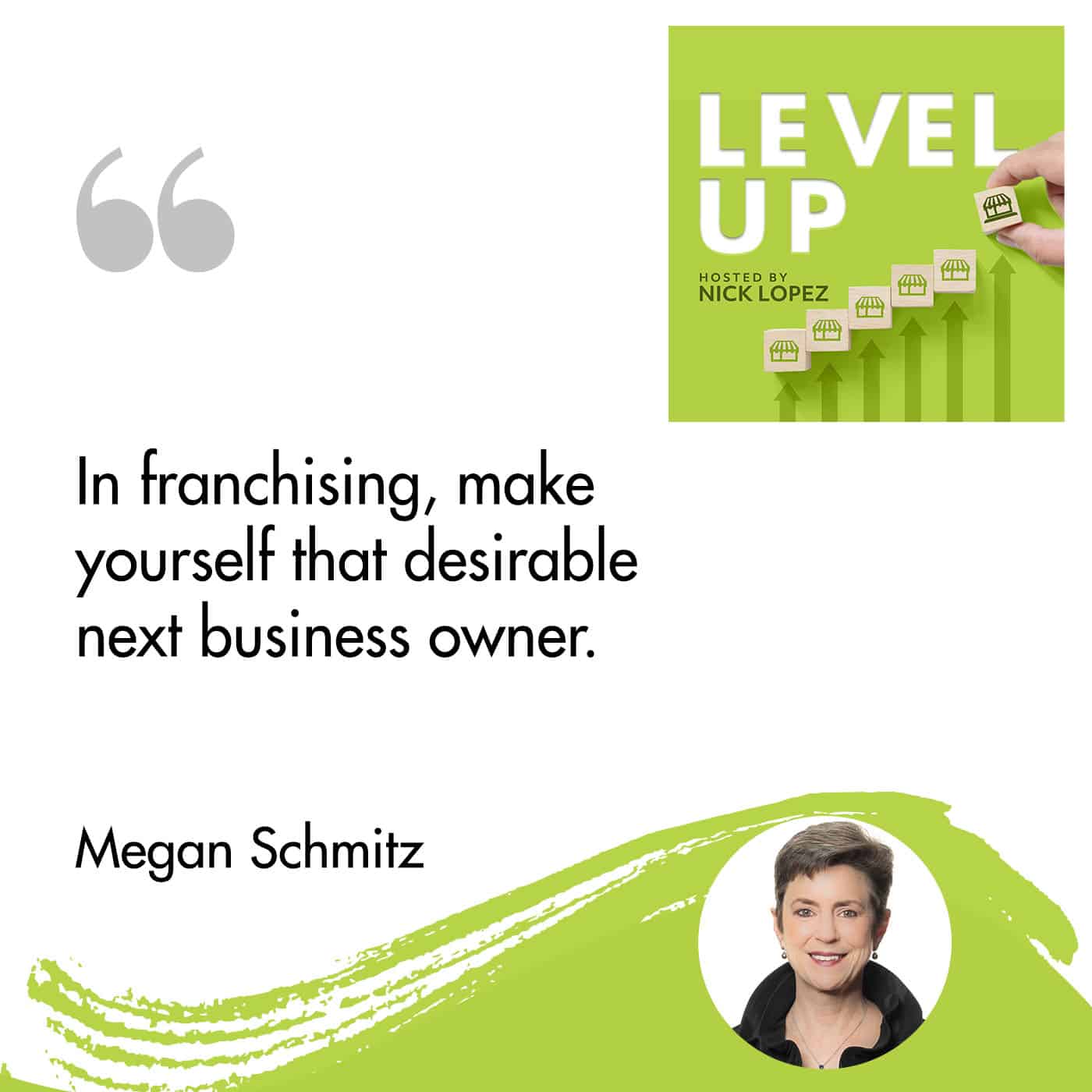
I can use a lot of analogies. I can see eyes growing and smiles coming on the face. That’s when I thought, “That’s the name.” That title, that name resonates with people who say, “I’m flapping out here. I need to align with a team.” That’s what franchising is all about. It’s a turn on a thought or a phrase for me that helps my candidate identify their need to align with a great team.
What a great title. It has me smiling over here the whole time. What a fun way to approach it.
Like you and this series for your reader, this is our ability to give back to them, enlighten them, show them the way, and illuminate a path going forward. Let’s face it. Owning a business is a challenge. It takes commitment. As you say, success requires effort. It requires stick-to-it-iveness and resolve and resilience. The great thing for us, your company, and for me aligned with FranChoice, is that we see the cream of the crop and we know the good ones. It’s still a tough decision, but when they land, they’re successful, and that smile comes across their face, that’s the bee’s knees. That’s the most fun part about all of this.
I second that, Meg. Let’s wrap it up. I can chat with you, frankly, for hours. With your wealth of knowledge, I appreciate you doing this, Meg, giving to our audience this way, and helping them level up. My final question for you is, why do you love franchising so much?
I am a rule follower. I am a recipe follower. I used the analogy earlier about the German chocolate cake. Do not send me to the grocery store and say, “Meg, would you whip up an incredible dinner?” Tell me what you want. I can deliver what you want. That’s what brings me to smile. I love the structure of a solid, great system. I know that my little chick of a candidate who’s coming through your process, you say yes and he or she says yes, that’s going to bring them an outcome that is potentially a wealth-generating game changer. That’s fun.

I can relate. I’m a little bit of a process and systems nerd on my end. That’s the core of it all. That’s the beauty of it. You get everything that you want from a business without creating the system, the process, the brand, the marketing, the infrastructure, the tech, the training, the recruiting strategy, and the playbook. It’s there for you. Meg, going back to your original statements about executing the process and then wrapping up the combo around the beauty in that, I appreciate you jumping on the show, Meg. You’ve most certainly helped me level up and I know our audience has benefited from it. Thank you, again, Meg.
Thank you for having me. I’ve been looking forward to this for days. Here we are, and you did a great interview. Thank you for having me on, Nick.
If somebody would like to reach out to you, Meg, how can they do that?
It sounds crazy, but I’m going to give you my business mobile number. Send me a text and say, “I’ve learned about you from Level Up.” (847) 302-2601 is my mobile number. Send me a text or an email. People will find me, Meg Schmitz.
I appreciate you reading. Please give this video a like. More importantly, contribute to this conversation. Let us know some of your thoughts about Meg’s focus on people, the upside-down pyramid, and everything else that you’ve heard. Please, give us a subscribe. It helps us grow and do this, give back. As always, level up.
Important Links
About Megan Schmitz
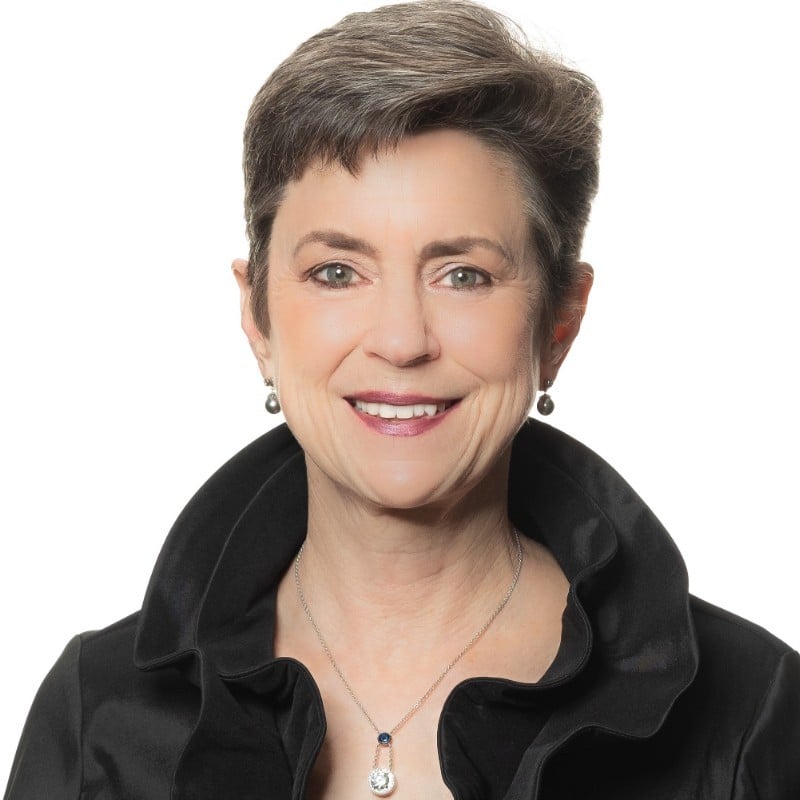
Megan Schmitz is a seasoned franchise owner who learned the ins and outs of entrepreneurship over the past 30 years. Having started her journey as the owner of a Great Clips franchise she quickly grew her business to five locations within eleven years. She understands the fear that comes with leaving the stability of a corporate job, but also knows that there is no such thing as job security in the corporate world.
She encourages others to bet on themselves and work with a proven franchise leader to achieve their professional goals. Megan’s success as a franchise owner is due in large part to her ability to learn from others. As the CEO of her business, Megan was never alone, building a network of trusted advisors and colleagues who supported her every step of the way. Today, Megan is armed with almost two decades of lessons learned in her journey of franchise ownership.
